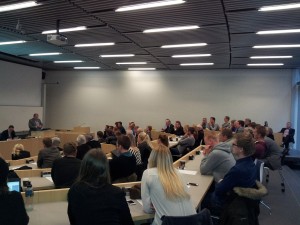At a well-attended meeting of Logretta, the Association of Law Students at the University of Reykjavik, 29 October 2013, former Supreme Court Judge Jon Steinar Gunnlaugsson argued that special charges imposed on the Icelandic fisheries were unconstitutional and therefore illegal. It was obvious, he said, that those charges were taxes by nature, so that rules applying to taxes would extend to them. The charges were laid on the holders of the individual transferable quotas which had been developed in the 1980s in order to limit access to the Icelandic waters. Gunnlaugsson said that as early as 1995 he had himself pointed out that such quotas were protected by the constitutional statute about private property. Gunnlaugsson said that both the general charge and the special charge imposed recently on the fisheries were unconstitutional. This was an illegal appropriation or seizure by government of private property. Moreover, those taxes were by their nature also retroactive.
The other lecturer at the meeting, Helgi A. Gretarsson, Associate Professor of Law at the University of Iceland, disagreed that all special charges on the fisheries were unconstitutional. He pointed it that there were clear provisos in the law on the individual transferable quotas that they did not form property rights and also that courts had insisted on the same principle, for example in three Supreme Court judgements, in 2000, 2012 and 2013. Gretarsson agreed however with Gunnlaugsson that the recent special charge on the fisheries was of doubtful legality. It could be in breach of articles 40 and 77 of the Icelandic constitution. Gunnlaugsson’s response was that the court judgements that Gretarsson had referred to had not really been on the nature of the individual transferable quotas, but about other issues; therefore, they did not have any general implications in this legal dispute. He said that the question which the Icelandic courts had to answer was the following: Is it constitutional that the Icelandic government seizes, with the imposition of special taxes, all or most of the profit being generated in the fisheries?
Many distinguished lawyers and business leaders attended the meeting, as well as students at the University of Reykjavik. While Logretta held it, RNH supported it as forming a part in the joint project with AECR, the Alliance of European Conservatives and Reformists, on “Europe, Iceland and the Future of Capitalism”.



